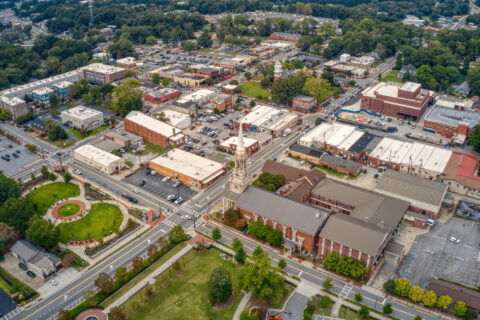Local governments must be able to raise enough revenue for the services their communities need, fairly and in a way that is consistent with their communities’ values. Unfortunately, local government revenue systems face a problem: the way they are currently set up is not aligned with modern economic realities. This contributes to distortions in the economy and taxpayers being treated unfairly. To do something about it, the National League of Cities, the Government Finance Officers Association (GFOA) and a number of allied organizations are undertaking an initiative to rethink local government revenue.

Let’s consider the quintessential local government revenue: the property tax. The changing economy has challenged the relevance of the property tax. Most fundamentally, a large part of the value created in the modern economy does not involve property—instead, it often revolves around less tangible things, like financial instruments or bits and bytes. On the other hand, the sales tax is important revenue for many local governments. Only recently have sales taxes been applied to online sales. Though this has helped keep the sales tax more relevant than it otherwise would be, sales taxes are routinely not applied to many services. Over past decades, consumers have been shifting more of their purchases from goods to services. There is no obvious reason for services to be exempted from the tax.
So what if revenues haven’t kept up with the times? Foremost, our outmoded revenue system can result in unfair tax and fee burdens. Often, those who pay taxes are not those who can afford to pay or who benefit from public services. For example, people whose wealth is primarily invested in property pay more than those whose wealth is located elsewhere (for example, financial instruments). Most significantly, lower-income people often end up paying a disproportionate burden of local taxes. For instance, lower-income people spend a larger portion of their income on taxable goods than higher-income people, so the sales tax often places a disproportionate burden on low-income people. The sources of revenue a local government uses to fund itself should reflect the bedrock value of democratic systems of government: fair and equal treatment.
In addition to fairness concerns, an antiquated revenue system can result in underfunding of important government services. Infrastructure might be the leading example, as U.S. infrastructure consistently gets subpar marks from the American Society of Civil Engineers. Other examples include poor schools, public health systems and public safety (as many police reform proposals call for additional resources for more training and new capabilities for first responders).
Finally, an outdated revenue system can mean increased vulnerability to economic downturns for local governments. The demand for many public services doesn’t change during economic downturns, and demand for some services may even increase. This means that local governments need steady sources of revenue. The property tax has usually proven to play this role. However, the property tax has become less important for local governments today compared with decades past, as politicians or the electorate sought to limit the amount of money that can be raised. Some of the revenues that have replaced it, like sales taxes, hotel taxes or income taxes, are much more vulnerable to the economy. An ideal revenue system would provide steadier resources so that local governments have enough resources available during downturns without ever overtaxing their constituents.
Learn More
Learn more about why rethinking local government revenue is necessary, as well as some alternative approaches cities can take, in a new report from NLC, GFOA and others.

About the Author:
Shayne Kavanagh is the Senior Manager of Research at the Government Finance Officers Association.









